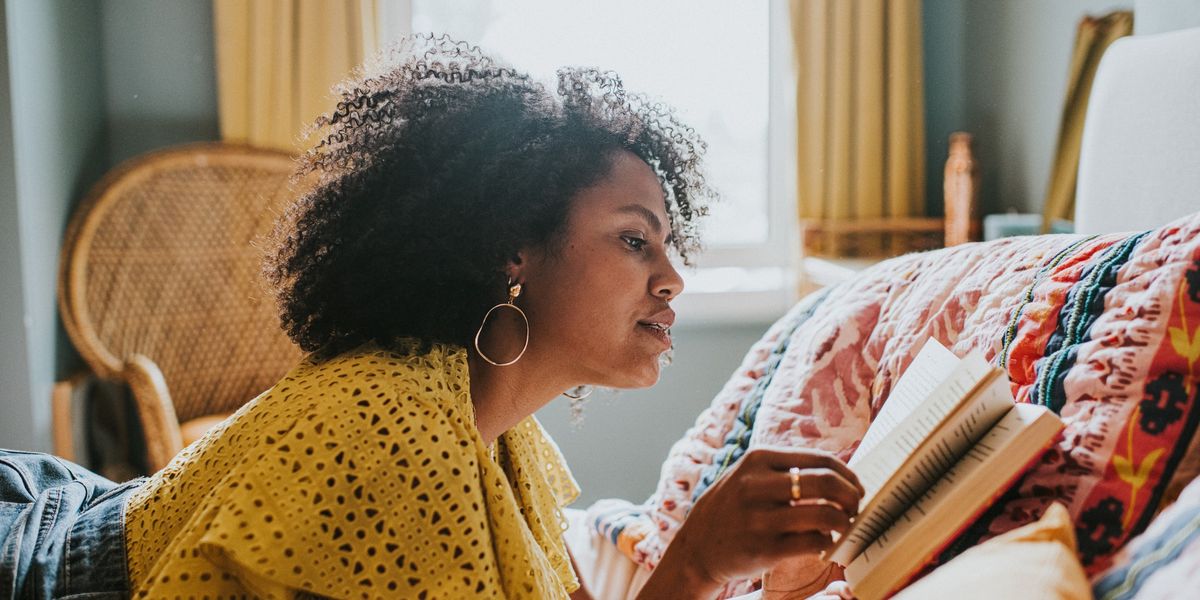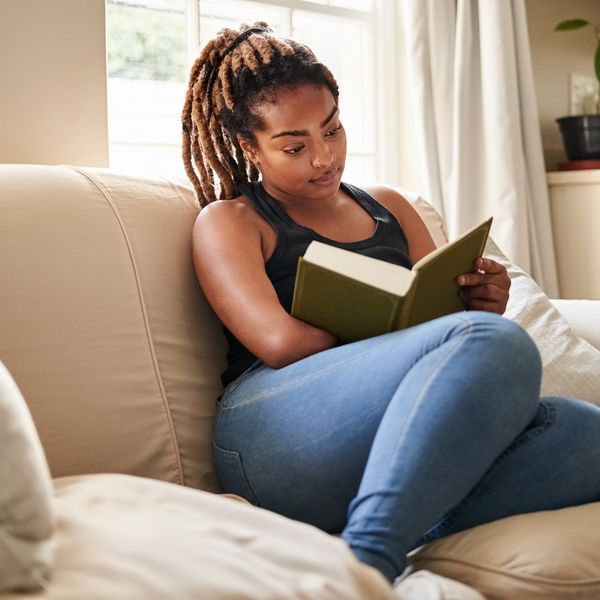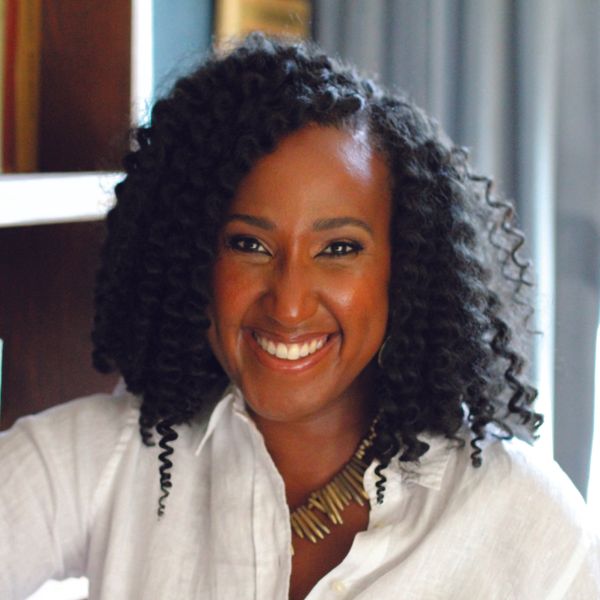
How Yasmine Cheyenne's Book 'The Sugar Jar' Reminded Me That I Am Enough
xoNecole's I Read It So You Don't Have To is a recurring series of self-discovery that breaks down self-help books into a toolkit of takeaways and tips that are meant to assist you in finding the best life you can live. Take what works for you, and leave everything else where it is.
At the beginning of the year, I knew I wanted to: 1) Prioritize myself and my dreams like never before and 2) Strive for authenticity in every aspect of my life. What I didn’t know was that in a few months, roadblocks would materialize, and old wounds would resurface. What started as well-meaning declarations slowly morphed into misguided attempts to chase after my dreams and show up for myself in the process. I felt overwhelmed by the unrealistic expectations I placed on myself and burnt out over balancing my responsibilities.
My belief in Jesus Christ is paramount and who I turn to first, especially when it comes to healing, but I’m also an advocate of therapy and utilizing positive resources that support my personal growth. I figured I’d try a resource that could complement my journey of inner work, provide insight into my personality, and remind me of the joy and peace that is within me.
So after ignoring the self-help and personal development aisle in the bookstore (I’m a fiction type of gal), I opted for Yasmine Cheyenne’s book The Sugar Jar: Create Boundaries, Embrace Self-Healing, and Enjoy the Sweet Things. As an educator, speaker, and mental-wellness advocate, Yasmine provides a thoughtful and impactful approach to healing and recognizing patterns in our lives that drain us.
Here are 7 takeaways from her book to embrace healing and practice self-care.
Care for Your 'Sugar Jar'
Cheyenne likens our body and mind to a jar. It represents who we are and how we present ourselves to the world. Within the jar is our sugar, or as she writes, “all the sweet parts of you.” It can be represented as our time, our energy reserved for the activities we care about the most, and our gifts/expertise. To prevent the sweetness in our lives from spilling out or from being given away frivolously, the lid on our jar serves as a boundary.
Caring for our jars, or our very essence, is more than placing them in a safe environment.
Through regular check-ins, we maintain the integrity of our jars. For instance, to recognize a sugar leak or a relationship/responsibility that drains our time and peace, we can pay closer attention to our needs and enforce boundaries to protect ourselves. We can change the size of our jars to hold more or less in our lives depending on the season we’re in. Most importantly, we can fill our jars by prioritizing self-care.
Prioritize Presence Over Performance
As a recovering people-pleaser, I often struggled with my desire to belong in spaces while showing up as my whole self. I would perform based on the expectations of those around me and find my worth in their praise of my performance. I would ignore red flags and pretend that I was okay to avoid having tough conversations. It was as if I wore a mask, shifting it in place or ditching it altogether, depending on who I was around. Performing in these ways drained me emotionally, physically, mentally, and spiritually.
Yasmine says that agreeing to perform is another way of saying, “I believe that who I am isn’t enough.” Instead of acting on the internalized belief that I have to be someone else to belong, I prioritized being fully present as my true self, even if it was uncomfortable.
I paid close attention to the suggestions presented in the book and began to:
- Recognize that it’s okay if I don’t fit in everywhere
- Acknowledge my emotions and desires even if it differs from those around me
- Cast imposter syndrome aside
- Refuse to downplay my successes
Know the Difference Between a Boundary and a Barrier
Boundary setting gets a bad rap. Often we view it as selfish or a way to bend others to our will lest they kiss a relationship with us goodbye. Cheyenne defines a boundary as “the rules or structures that we put in place that manage the way we interact with the people, places, things, and commitments that we have in our lives.” Boundaries help us communicate our needs and how we intend to show up in the world around us. They also keep us safe and protect our mental health. However, in an attempt to protect ourselves from experiencing pain, we sometimes build a barrier that ends up keeping good things from entering our lives.
For example, a boundary could be explaining your needs to a friend after feeling as though you aren’t a priority in their life. A barrier could be ending the friendship the moment you’re disappointed and swearing off getting close to others in an attempt to avoid future disappointment.
It can feel intimidating to set boundaries with people who might have constant access to you or even to set boundaries with yourself, but starting small is key. Here are a few tips to get you started:
- Say yes to opportunities that align with who you are and your beliefs
- Decline an invitation if you know you need to prioritize rest (or if you simply don’t want to attend)
- Ask yourself what you’re comfortable with and communicate it
Let Go
The Sugar Jar helped me realize that letting go is an act of self-care. For most of my life, I held onto perfectionism and the notion that I needed to earn my worth. I could understand when others fell short of my expectations, but I would mentally berate myself if I missed my mark. I didn’t give myself the space to make mistakes and was far too tough on myself. I came to realize that holding space for myself when I am less than perfect means that I am human. And most importantly, I recognized that even with my flaws, I am enough.
Letting go also meant releasing the version of myself I’d outgrown without guilt. There were iterations of myself that existed for specific seasons. One version existed when I was content with playing small and believed that I didn’t have what it took to achieve my dreams. Another version needed to be in control 100% of the time to feel safe. I found joy when I realized that I could appreciate who I used to be but realize that there’s no shame in evolving.
Lean Into Acceptance
I used to bypass the inner work I needed to complete in my life by focusing on others. I wore my ability to encourage and counsel those around me as a badge of honor and poured so much energy into watching them transform. It’s no wonder I would feel frustrated if they chose a different path or if they felt content operating in a way that I didn’t agree with. I learned that acceptance doesn’t mean tolerating poor behavior but meeting people where they are.
Once I learned that it’s not my responsibility to change anyone (especially a person that doesn’t believe a change is necessary), the pressure I once felt decreased. Leaning into acceptance meant I recognized that we all have different capacities and timelines for growth.
Simply put, once I started to accept others for who they were I started to focus on my growth.
Dismiss the Urge To Be the “Strong One”
As I mentioned earlier, I derived a lot of pride from pleasing others. Not only did I lack boundaries, but I also played into the societal pressure to be strong 24/7. After all, wouldn’t I be liked even more if I showed that I could handle any and everything? Wouldn’t I prove I’m a great wife, mother, friend, and daughter if I supported my loved ones at all costs? I was wrong. Even worse, I had embodied the Black Woman Trope even though I knew better.
I justified my actions because I pegged myself as the “strong friend,” the “reliable daughter,” or the “super mom.”
There’s nothing wrong with exhibiting strength and showing up for loved ones, but this book gently reminded me that even the “strong ones” need support too. Consider the following questions that were posed in the book if you’re fighting the urge to constantly show your strength:
- Does someone’s need for me help me feel stronger, validated, or necessary?
- How can I be strong and worthy of connection without fully supporting everyone else’s weight?
Gauge Your Healing
It would be easy to gauge our healing if it presented itself as a simple cut on the hand. We'd watch the blood begin to clot and the skin around the wound seals itself until nothing but a tiny scar remained. Unfortunately, there's no clear-cut path to healing from the wounds we cannot see. The good news is that we can assess our healing by checking in with our emotions and taking stock of the improvements we've made (big or small).
Cheyenne says, "Just because you've learned some tools, it doesn't mean you won't have fears, intrusive thoughts, or concerns about choosing the 'right' things for yourself." There are no magic pills to take and no finger snaps that can erase the negative feelings associated with healing. But we're aiming for progress, not perfection, as we heal. So, for example, if you've struggled with setting boundaries, you might see that you are healing when you finally communicate it. You might still feel nervous about the action, and it might not even come out as smoothly as you want it to the first time. You'll notice you're healing even more when you're able to communicate your boundary with ease and can enforce it.
Embracing the intricacies of our healing and shedding parts of ourselves that no longer serve us takes dedication and a lot of work. But even as we work towards being a better version of ourselves, we can still experience the sweetness the journey has to offer.
Let’s make things inbox official! Sign up for the xoNecole newsletter for daily love, wellness, career, and exclusive content delivered straight to your inbox.
Featured image by Catherine Falls Commercial/Getty Images
How This New Bond Repair Line Transformed One Mother's Postpartum Shedding Into The Ultimate Curl Comeback
This article is in partnership with SheaMoisture
For Crystal Obasanya, her wash day woes came shortly after her son did. The beauty and lifestyle content creator had been natural for years, but during postpartum, she quickly learned about one reality many mothers can relate to experiencing: postpartum hair loss. “Sis had thinning hair. Sis had split ends,” she shared about her hair changes in a Reel via xoNecole.
Over a year into her postpartum journey, Crystal explained she also had dry, brittle hair, noting that keeping it hydrated before pregnancy had already been “a task.” The 4C natural recalled going from thick hair during pregnancy to a thin hairline due to postpartum shedding as “devastating.” When it came to strengthening and revitalizing her hair, the new SheaMoisture Bond Repair Collection was just the thing she needed to elevate her damaged coils to revive and thrive status and get them poppin' again.
SheaMoisture is providing us with the cheat code for transforming dry and damaged strands into thriving and deeply nourished crowns. By unveiling their 4-step hair system, the SheaMoisture Bond Repair Collection is equipping you with the tools to reverse signs of hair damage caused by protective styling, heat, and color and is uniquely formulated for Type 3 and 4 hair textures.
The haircare system revives damaged natural hair by repairing and rebuilding broken hair bonds through a game-changing combination of HydroPlex Technology and AminoBlend Complex, a unique blend of fortifying amino acids formulated specifically for curly and coily hair. Scientifically proven to reduce breakage by 84% and make your hair six times stronger (vs. non-conditioning shampoo), the collection infuses your hair with the nourishment it craves and the strength it deserves.
All five products of the SheaMoisture Bond Collection are infused with natural strengthening ingredients like Amla Oil and fair-trade shea butter. The collection consists of the 4-step breakage-fighting Bond Repair system, as well as the Bonding Oil.
“When trying it out, I quickly noticed that my hair felt revived and renewed, and my curls were so hydrated,” Crystal said while using the Amla-infused Bond Repair Leave-In Conditioner. “I also felt my hair strands were stronger.” So much so that the influencer felt brave enough to get her hair braided shortly thereafter. “I can definitely say that I will be keeping it in my hair wash routine,” she added in the caption of her Reel about her positive experience using the products.
SheaMoisture Bond Repair Collection is making bond-building a key player in your wash day routines and the purveyor of life for thirsty manes. Because who doesn't want stronger, shinier, happier hair?
Step One: Bond Repair Collection Shampoo
Rejuvenate your hair with SheaMoisture Bond Repair Shampoo, your go-to solution for luscious locks. Packed with hella hydration power, this shampoo adds moisture by 60% while removing buildup without stripping your strands. This shampoo gently cleanses impurities while significantly enhancing shine, smoothness, and softness.
The Bond Repair Collection Shampoo is the first step in the 4-step Bond Repair system, all of which are powered by the uniquely formulated AminoBlend, and HydroPlex, SheaMoisture’s technology that rebuilds hair strength at its core.
Step Two: Bond Repair Collection Conditioner
Tailored to repair styling damage, this creamy conditioner locks in 12x more moisture than standard non-conditioning shampoos, boosting damaged hair strength by 1.5x with significantly less breakage. The creamy SheaMoisture Bond Repair Collection Conditioner deeply hydrates, enhances manageability, and leaves your hair looking healthier and shinier.
Step Three: Bond Repair Collection Masque
This Ultra Moisturizing reparative masque is a moisture-rich game-changer for those dealing with the aftermath of hair damage caused by styling. The SheaMoisture Bond Repair Collection Masque delivers 13 times more moisture compared to non-conditioning shampoos, ensuring your hair feels nourished and soft. Designed to repair and rejuvenate, this masque significantly strengthens damaged hair — making it twice as strong while reducing breakage.
Step Four: Bond Repair Collection Leave-In Conditioner
Elevate your curl game with SheaMoisture’s Bond Repair Collection Leave-In Conditioner. Lightweight and hydrating, the Bond Repair Leave-In Conditioner provides 12x more moisture than non-conditioning shampoos and tames frizz with 24-hour humidity control. Designed to define curls and coils, the leave-in conditioner enhances softness and shine allowing you to detangle effortlessly.
Bonding Oil
The SheaMoisture Bond Repair Collection Bonding Oil is a multitasking all-in-one formula that acts as a heat protectant and provides the hair with moisture, strength, shine, damage protection, and intense nourishment. This lightweight oil not only offers 24-hour frizz and humidity control but also fortifies your tresses, making them up to 5 times stronger with significantly less breakage.
Featured image courtesy
Nia Long Reveals How She Financially Prepared Her Children For The Future
Nia Long has left a mark on the entertainment industry as a renowned actor and producer.
With over 70 projects to her name, the 53-year-old has starred in timeless classics such as Boyz n the Hood, Friday, Love Jones, The Best Man, and the Big Momma's House franchise. Despite her success in Hollywood, Long considers her most significant role to be a devoted mother to her two sons, Massai Dorsey II, 23, and 12-year-old Kez Udoka.
Like any dedicated parent, Long has provided for her children and taken significant steps to secure their future. The star has gone beyond typical parental duties by financially investing in her sons' long-term well-being and success. During the Money and Mindfulness: A Conversation with Nia Long panel at the American Black Film Festival, Long shared the strategies she used that helped one of her sons graduate college debt-free.
The actress' oldest son, Massai Dorsey II, recently graduated from NYU.
During the discussion, Long revealed that before she became a mother, she had started putting money away for her children in an account.
“One of the things is [that] I started saving for my children before I became a mother,” she stated. “I took $3,000, and I just put [it] in this account. I was like, ‘I’m never touching that.’ And it allowed me to get my son through NYU without any student loans.”
Although the Missing star didn't disclose specific details about the type of account she used, Long expressed gratitude for achieving her primary goal of ensuring her children want for nothing.
“I’m so proud. It makes me cry because we did it. Yes, we did it. And it was a plan. And if you put that plan into action and you just don’t waver from your ultimate goal, God will show you the way to get there. I can’t even explain it any other way. You just have to trust the process,” she said.
Toward the end of the conversation, Long explained that while she has financially supported her children through school, she's careful not to overdo it, emphasizing that she wants her children to understand the value of hard work.
“So in four years, anybody in here looking for a young lawyer [or] attorney, he’s going to be a good one,” she quipped while mentioning Dorsey’s future goals. “He needs a job to pay me back. If he’s anything like me, he has a spirit of abundance… a little bit too much because he’s still in my pocket. I just called him on my way here. I got a bill for his electric bill. I said, ‘Massai, really?’ And see, this is the thing, you can’t spoil them too much because part of what made me do what I’ve done is the hustle. You’ve got to draw the line where you don’t tamper with the hustle because in that hustle is that little bit of gangster that makes us make a difference.”
Let’s make things inbox official! Sign up for the xoNecole newsletter for love, wellness, career, and exclusive content delivered straight to your inbox.
Feature image by Kevin Mazur/Getty Images for Atlantis The Royal









